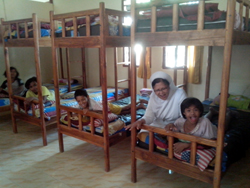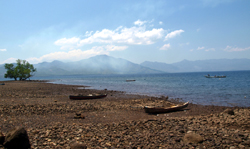Letters From the Highway is a collection of observations from around the World. A sometimes distorted, sometimes niave, often gritty view from the window of a 5 star hotel or the top of a garbage pile.


17/10/2014 - DILI, TIMOR-LESTÉ | A bridge between nations
Arrival this morning in Dili was through a light haze. Spot fires are burning in the rugged hills behind the town. Everything looks so dry. From 2,000 metres, everything looks so Australian.
The Indonesian Visa process is challenging, and there is clearly a purpose as to why this is so. Melbourne's Indonesian Consular General tells you to get a visa in Darwin. In Darwin they inform you that you need to get a visa in Dili. So, when you arrive in Dili there is nowhere else to go. Compliance is mandatory. Failure here means a u-turn.
The system has changed here at the Embassy. Previously, at 0900 hrs there was a human crush at the gate. No matter how long you had been waiting, your age, your sex, the crush was without discrimination.
These days you turn up early to put your name on the appointment list for the following day. The appointment list has 50 places. If tomorrow's appointment list is full, then you come back even earlier the following day to make an appointment for the day after that.
In terms of maintaining an orderly process, it's definitely a step in the right direction. In terms of satisfying customers... who cares!
The cost of a visa has gone from US25 two years ago to US50 now. Single entry, 30 days, three month expiry. Same product, double the price. Fly in to any entry point and the visa is cheaper and issued almost without question. Enter the country via a land border and you are a criminal until you prove otherwise.
Government agencies, and in particular immigration departments, can be terrifying people to engage with simply by virtue of their power to change your destiny. Indonesian immigration is a world leader in intimidation. Indonesian immigration officers study nonchalance, pedantics, aggressive stamping, cold shoulder and stealy stare before admission to the corps.
Nothing much seems to have changed here in the last 2 years. There seems to have been lots of money spent, contracts awarded, signs put in place... but no result. The half finished curbing along the main drag is in precisely the same state as 2 years back, except that most of the "work in progress" signs have been stolen and are probably now someone's roof.
This is a nation that will forever struggle to achieve an identity. It's not Portugal any more, despite the fact that the Portuguese still control the economy and milk every cent possible. It's definitely not Indonesia, and the Indonesian government are quite happy to see the poverty and squaller maintained as part of their "we told you so" philosophy.
The country is almost totally reliant on imports, with only income from the north west shelf gas project to balance the ledger. The only real export of any quantity is coffee. The fact that you have NEVER seen Timorese coffee on the shelf at Woolies speaks for itself. The only reason that they export it is because it is so bad even the locals won't drink it.
It's hot, and humid. The geckos are sweating. The air conditioner is lying about the temperature. In fact it is so hot I've taken off my Explorer socks.
Visa collected on Tuesday, and if the ship is not held up in the port my beast should be here Thursday. Then South west to Kupang and the most gruelling ferry ride in the world. Kupang to Larantuka... 18 hours. The calm cruel Sunda Sea.
20/10/2014 - DILI, TIMOR-LESTÉ | I wonder what Shirley did this morning?
Balibo is a small village high in the mountains of East Timor, and close to the Indonesian border. It is remembered by most Australians as the location where 5 journalists and photographers were gunned down in 1975 at the height of the Invasion of East Timor by the Indonesian military. Varying versions of the incident have been established by numerous investigations. It seems clear, however, that the deaths were not simply collateral damage.
The site today bears little resemblance to the black and white images we saw on television in 1975. The bullet holed buildings have gone. There is a small plaque commemorating the incident. When put in perspective to what was happening to the broader population across the entire nation this event seemed insignificant.*
Channel Seven cameraman Greg Shackleton was amongst them, and his wife Shirley has tirelessly and relentlessly continued to raise questions surrounding this event ever since. The Australian Government of the day wished the whole matter would go away, and remained unwilling to make any commitment, political or military, in the defence of one of our closest neighbors. Even more tragic was that the Government of Portugal, the effective defenders of sovereignty, did nothing.
The invasion was pre-meditated, swift, aggressive and extremely effective. Estimates put the death toll at up to 200,000. The rape and pillage that followed and the destruction of infrastructure is still a visible scar on this struggling young nation. The price of independence can be high. In the case of East Timor it could not have been more costly.
Shirley Shackleton is probably the single most important person in keeping the plight of East Timor in front of Australia's face. For those of us that can remember, she reminds us. For those of us that weren't even born, she educates us.
This morning the Australian Federal Police have announced that they will discontinue any further investigation into the 'Balibo 5' incident.
This morning the Australian Prime Minister who watched the invasion of East Timor, and ignored it, passed away.
This morning Tony Abbott has shaken the hand of Joko Widodo, the newly sworn in President of Indonesia.
I wonder what Shirley did this morning?
* Last year Shirley Shackleton received one of Timor-Lesté's highest honors, the Order of Timor-Lesté Medal, in recognition of her outstanding contribution to peace and humanity in the country.
26/10/2014 - TO PETER BERHENDT | the DILI legacy
I thought that it was interesting that Gough Whitlam's death was virtually simultaneous to the AFP announcing that its investigation was to be closed, and only hours after Tony Abbott met with the newly sworn in Indonesian President.
With absolute respect, I appreciate your corrections, your fine tuning of my commentary, but putting all the history to one side, there were two conclusions made. The first was an observation of the quite remarkable coincidence of the timing of the events, and secondly, a thought for a person who has virtually devoted herself to keeping this event alive for so long. When Shirley and you and me are gone, Balibo will fade into obscurity.
Now, I can't accept that you think these five men deserved what they got. Even if they were sympathisers, they got a worse deal than Peter Gresta? At least Peter Gresta was tried in a court of law by an impartial judicial system. He has the time to write his memoirs, and he is young enough to dine out on this for the rest of his life. Shackleton and the others were delivered pre-trial military justice.
At the memorial to the five that were allegedly slain, they are portrayed as innocent heroes. That would not surprise you.
There are probably few people in Timor, or or even the Balibo region, that have any recollection of this particular specific event. What they probably remember are the members of their own families that were killed, and not the 5 Australians. I have met a number of people who were witness to the invasion. It was by any standard, a brutal and well planned 'lesson'. Yes, Indonesia was shitty, and arguably they had every right to be. But then on the other hand, they had invested money in infrastructure and assumed proprietorship at their own risk.
History will conclude, when all the players are dead and buried, that the shit this country is in now is because of the gigantic egos of the leaders of the rebel groups. They are still constructing memorials to themselves in a country that does not even supply water to over 60% of the population.
27/10/2014 - KEFAMANANU, WEST TIMOR | Water for children
It's been a particularly dry season across Timor, East and West, and it Is not uncommon for water trucks to be delivering to homes, villages, schools and hotels.
Kefamenanu is in the heart of West Timor and surrounded by mountains rich in manganese and copper. The economy of the town is flourishing and the population growing rapidly. Mining is done by hand and in most cases the rich ore is bagged and loaded manually onto barges at the port of Wini on the north coast. From Wini the ore used to be transported to China, but no more. The government has stopped the exportation of ore to any port outside of the country. All ore must be refined in Indonesia, usually Surabaya on Java, and the refined ingots then offered to the export market. Seems to make sense.
With commerce booming in 'Kefa', the usual myriad of social problems arise. Whilst the government is anxious to benefit from commercial success, it is less inclined to return the spoils to the community. The responsibility of caring for the less advantaged remains a community, family, or church concern.

This morning I visited an orphanage for 'challenged' children run in conjunction with a Catholic school in Kefa. This orphanage is sponsored by a friend in Melbourne, and as I was passing it was an opportunity to meet, greet and take a few snaps that might assist with fund raising. Getting close and personal with a community microcosm such as an orphanage provides a great insight to life in the region. Sister Yofina led the kids in a performance of their daily routines... floor mopping, cooking, collecting and stacking firewood. All the rituals of a regimented daily program... Including washing.
The orphanage has very limited water resources due to poor rainfall this dry season. The limited water that they do have is contaminated, can't be used for washing, and most certainly cannot be drunk. Each morning the children march through the paddocks and crops, past the bullocks, down to the barely flowing river about 600 metres away from their dorms. Clothing, including footwear, is washed in the river.
To buy water the orphanage is reliant on the community, or contributions from aid organisations.
Kefamenanu has become a bustling, prosperous expanding economy. Old hotels have had makeovers to compete with all the new hotels that are appearing in what used to be a sleepy market town. The noise of scooters in the Main Street has been amplified. Job opportunities have increased, and the population is expanding rapidly. The orphanage remains without clean water.
"I'd love to go to New Jersey, but I gotta a lotta shit happenin' in the States right now"
Arj Barker
29/10/2014 - WAIKLIBANG, FLORES, INDONESIA | Bush medicine
Now where was I? Ah, yes, Kefa and the water crisis.
For all my sins and wrongdoings, I catch the ASDP Ferry from Kupang to Larantuka.
Many of you are familiar with this gruelling, punishing, tortuous 18 hour voyage, so I really don't need to dwell on it too much, other than to say that it is not possible to sleep on a metal floor next to 1,000 day old boxed chickens. Three hours killed on the bridge with the crew.
Think about this for a minute. A medium sized RO RO ferry. 15 trucks laden with mainly horses, cows and pigs. 220 motorcycles. Around 700 Indonesians sleeping on floors, chairs and luggage racks. Two toilets. No moon, and less navigational equipment than my motorbike. The Sunda Sea is 3.8 kilometres deep. The ferry was built in 1974 in Myanmar.
Arrival at Larantuka Port is Indonesian chaos at its most intense. More people seem to come onto the ferry than disembark. Motorcycles, trucks, animals, and of course 18 hours worth of rubbish littering the floor. The first light of the day begins to outline the surrounding extinct volcanoes which enclose Larantuka. The white waves breaking on the black sand beach are like a welcoming smile in the dull light.* (Lari, Lari, How I missed ya, How I missed ya, My dear old Lari)*
Indonesian medical students study at University for 4 years and then complete their 'internship' in regional medical centres across Indonesia for a few more years. Their pay is minimal, and the government does not subsidise their travel or living expenses.
About 10 kilometres north of town is my preferred accommodation when in Larantuka. However, due to a misunderstanding, I end up a bit further down the road at Sunrise Retreat. I really should learn more Bahasa. It was however a fortuitous blunder.
After the post ferry desalination had been completed (body & bike) I met Florence, a doctor working in a local medical centre, and staying with her colleague at the Sunrise. We had dinner later and chatted until the early hours.
In their final years of internship the government will, and does, send them to often remote locations, and there are few locations as remote as Waiklibang, about 35 kilometres north of town, and at the end of the road for east Flores. At this remote village, the doctors operate a 'Puskesmas', or 'front line medical facility'. The road up is badly degraded and in parts very hard work on a bike. The medical centre and hospital resemble a scene from Auschwitz.

Waiklibang was hit badly by the 2002 tsunami that struck and damaged so much of the coast of PNG. (Before that we called them Tidal Waves). Many buildings were damaged or destroyed, and little has been done to repair the existing structures. I've no idea how many lives were lost, and maybe even the Indonesian authorities have no clue.
The doctors attend to basic clinic functions, but are also actively involved in educating the locals about diet, sanitation, family planning, STD's (including AIDS), sanitation and preventative medicine. The limitations of clinics conducted in these remote locations are, diagnosis, advice to manage, wound suturing, dressing, supply of medication. Patients requiring anything such as dialysis, surgery, intensive care, are all sent to either Larantuka Hospital, or Bali, depending on severity.
These doctors are working for little reward. They are working in one of the most remote parts of the archipelago, if not the world. They are working for the betterment of the people of a community so far removed from their own lives, and they are working with a conviction and dedication that is rarely evidenced anywhere else in this country except in politics.
Could someone please invent a medal for people like this?
Maybe we could hold a huge awards night for all the silent heroes that don't want it. We could all turn up and sing the praise of those that won the award, but didn't turn up to collect it.
NEXUS. An incredibly inspiring group of young people who are making a real difference to, and will change, the world. A growing group of organisers, leaders and delegates. 2000 world wide with a net worth of over $750 billion. Most under 30.
(If this quote means nothing to you, just disregard it)
In Australia we hero worship the likes of Weary Dunlop and the murdered Dr William Chan. Great humans. But we forget one simple thing. They never set out to be heroes. They just set out to do a good days work. They were not driven by financial gain, just the simple desire to use their knowledge and skills to help others.
I dips me lid.
